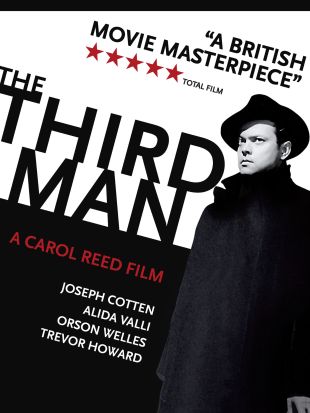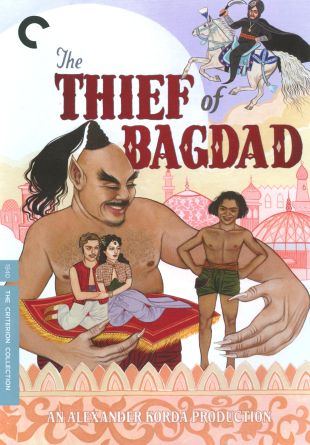The first motion picture producer ever to receive a knighthood, Alexander Korda was a guiding force behind the British film industry throughout the 1930s as a studio chief, producer, and sometime director, and continued as a major -- and highly influential -- film producer until his death in 1956. Although synonymous to the world with British films, Korda was Hungarian-born, and worked in movies in Austria, Germany, and America, without finding any particularly notable success, before coming to England in 1930. He was a crafty businessman as well as a flamboyant personality; he favored bold, ambitious, opulent productions -- Michael Powell and Emeric Pressburger modeled Boris Lermontov, the egotistical ballet impresario of The Red Shoes, partly on Alexander Korda. And toward that end, by 1933 he had founded a major (though always financially shaky) studio in London Films, and managed to pull off a seemingly impossible feat by directing and producing The Private Life of Henry VIII (1933). The latter film succeeded as no British picture since the advent of the talkies had, becoming a major hit in America, also earning an Oscar nomination as Best Picture and turning its star, Charles Laughton (who won the Best Actor Oscar), into an international star.
From that first great flash of success, London Films went on to occupy a unique niche in the firmament of the British cinematic world. Indeed, the studio was a study in brilliance and contradictions. For starters, there was its name -- it may have been "London" Films, but it was built on Korda's production genius, and also the work of his brothers, Zoltan Korda (one of England's best directors) and Vincent Korda (a world-renowned art director), along with their assembled staffs of writers, artists, costumers, etc., almost all of them expatriate Hungarians. Despite the national origins of its founder and most of its employees, however, the studio seemed bent on "selling" the British Empire all over the world, a fact not lost on the British bankers who financed the film industry or government officials whose financial and regulatory policies had profound impact on the motion-picture business.
Korda also saw success with a handful subsequent movies, including The Scarlet Pimpernel (1934), The Ghost Goes West (1935), and The Man Who Could Work Miracles (1936). Rembrandt (1936), starring Laughton, is still considered by many to be among the great artist biopics; Things to Come (1936) is a multi-generational science fiction epic that expanded the boundaries of cinematic to a range that neither had exhibited since the heyday of the silents; Fire Over England (1937) is an account of Elizabeth I and England's successful defense against the Spanish Armada, which the storyboard for Warner Bros.' subsequent production of The Sea Hawk; Clouds over Europe (1939), starring Laurence Olivier is an espionage comedy that anticipated the 1960s series The Avengers; and The Thief of Bagdad (1940), starring Sabu and Conrad Veidt, remains one of the finest fantasy films of the time.
By the end of 1939, Korda was in the midst of the extended production of The Thief of Bagdad, but had literally run out of money and credit in England. The outbreak of the Second World War in September of that year was the tipping point, forcing Korda to move his operations to America early in the following year. He was able to finish the film in Hollywood, in the process bringing over his two brothers as well as composer Miklos Rozsa, all of the film's stars, and a brace of other production notables who would make their careers in America, some for the duration of the war and some permanently. The Thief of Bagdad was successful enough to wipe out most of his debts and allow the producer to set up Alexander Korda Productions -- using the same Big Ben logo that had opened all of the London Films releases -- in Hollywood.
The most important production to come out of Korda's Hollywood period was That Hamilton Woman (1941, aka Lady Hamilton), an account of the illicit romance between British naval hero Lord Nelson (Laurence Olivier) and Lady Emma Hamilton (Vivien Leigh) at the turn of the 18th century into the 19th century. It was the only movie that Olivier and Leigh did as husband and wife, and proved so compelling as veiled anti-German propaganda that it led to Korda's being investigated by the isolationist-minded United States Congress. He also made several enjoyable though less distinguished movies, including Lydia (1941), a handsome dramatic vehicle for leading lady Merle Oberon (who was also Korda's wife by then), and The Jungle Book (1942), with Sabu. And Korda played a key role in the production of Ernst Lubitsch's topical comedy To Be or Not To Be (1942). It was also during this period that Korda received his knighthood, an honor accorded him by the crown at the behest of the government of Winston Churchill. Although it was ostensibly for his work as a producer of movies, the knighthood also derived from his periodic clandestine work on behalf of the British government during World War II, when his trips across the Atlantic and other production activities served as cover for secret operations.
Korda resumed production in England after World War II, reactivating London Films in the process. His initial postwar activities, however, were conducted somewhat in the shadow of J. Arthur Rank, a rival British film mogul whose vast network of theaters, coupled with his acquisition of various studios and their facilities, had turned him into the reigning giant of the British movie industry in Korda's absence. But the departure from Rank's company of such talented filmmakers as Powell and Pressburger, Olivier, David Lean, and Carol Reed in the second half of the 1940s gave London Films new opportunities. The company didn't make many movies, but the quality of the films they did produce was often staggering. Among its successes were The Small Back Room (1949), The Fallen Idol (1948), The Third Man (1949), The Tales of Hoffmann (1951), The Sound Barrier (1952), Summertime (1955), and Richard III (1955).
The financial underpinnings of Korda's studio were as shaky as ever, and with his death in early 1956, London Films was closed down. Ironically, it was just as the studio ceased to exist that its worldwide profile rose to a level it hadn't enjoyed since the 1930s, thanks to Korda's having sold his library to television in the mid-'50s, long before any American studios had made their films available for broadcast. His movies were among the best that could be seen on television for most of the second half of the 1950s and right into the '60s, by which time the company and its Big Ben logo were associated once again in the minds of film fans with movies of the highest quality. That logo remains among the most familiar in motion pictures; and among Korda's productions, The Thief of Bagdad has proved the most enduring across the decades. Even in the 21st century, with the movie long since available on VHS tape and DVD, it still fills theaters in periodic theatrical revivals. Known for moviemaking on a grand scale, Korda was probably the most articulate producer-showman in the history of motion pictures.


